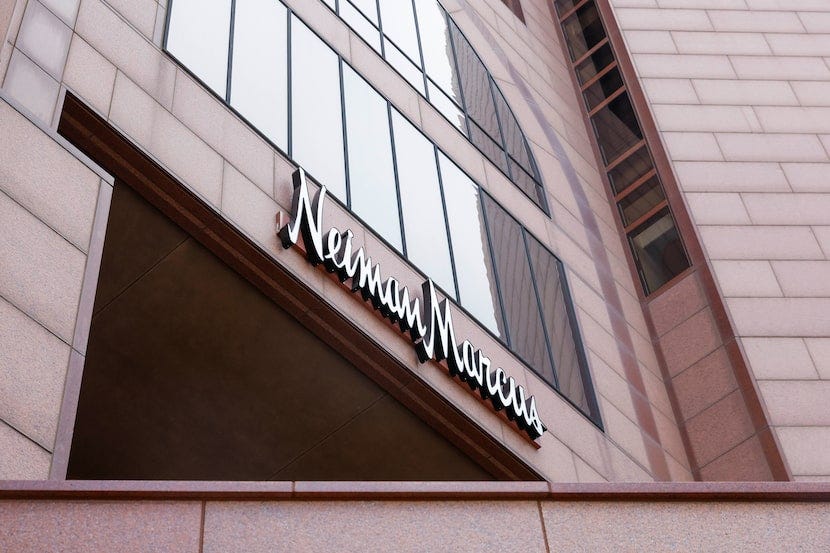This Week in Retail #65
Hey Friends,
Happy Presidents Day to all that celebrate. Not every week is groundbreaking, but a lot to cover, from January sales data to the corporate newsrooms. Without further adieu, let’s get into it.
U.S. retail sales fell 0.9% in January, the largest drop since March 2023, likely due to severe winter weather, wildfires, and vehicle shortages. However, December sales were revised upward to 0.7% from 0.4%, easing concerns about a major consumer spending shift. Core retail sales, which exclude autos, gas, building materials, and food services, declined 0.8% after a strong December.
Auto sales led the decline, dropping 2.8%, with vehicle production down 5.2%. Other categories, including online sales, sporting goods, furniture, clothing, and electronics, also saw declines. However, restaurant spending rose 0.9%, signaling continued consumer confidence.
Economists believe the drop may be temporary, with weather and tariffs playing a role, and expect sales to rebound. The Federal Reserve is still unlikely to cut interest rates before the second half of the year. The Atlanta Fed lowered its Q1 GDP growth estimate to 2.3% from 2.9%, but the economy remains resilient due to strong employment and household wealth.
Skechers has surpassed 5,000 branded retail stores worldwide, marking a major milestone in its global expansion. The 5,000th store opened in Bogotá, Colombia, with other recent locations in Chile, Greece, India, Mexico, South Korea, and the U.S.
President Michael Greenberg emphasized that Skechers stores play a key role in strengthening brand loyalty by offering a consistent shopping experience across six continents. Since opening its first store in Manhattan Beach in 1995, Skechers has steadily expanded, with plans to open 140–160 more company-owned stores in 2025 and hundreds more with retail partners, aiming for 10,000 stores in the future.
As quickly as I could report on the merger, John Eck has stepped down as CEO of Mattress Firm. This comes just a week after Tempur Sealy completed its $5 billion acquisition of the company. Tempur Sealy CEO Scott Thompson will serve as interim CEO, while Eck will stay on as a consultant to assist with the transition.
Saks Global has closed Neiman Marcus’s Dallas corporate headquarters in a cost-cutting move, citing low in-office attendance. The office, designed for 800 employees, was reportedly used just 11 days per year on average. However, the building’s owner, NexPoint, disputes the lease termination and seeks discussions with Saks to address the commitments made by Neiman Marcus when selecting the location.
Saks is also shutting Neiman’s New York City office in Bryant Park, consolidating those employees into its own headquarters. Most Dallas-based staff will remain remote, with some relocating to office space above Neiman’s flagship store. Saks CEO Marc Metrick emphasized that the company’s focus remains on customers and the community rather than office locations.
Saks, controlled by HBC, continues to integrate Neiman Marcus following last year’s acquisition, streamlining operations while maintaining Neiman’s presence in key markets.
Joann, the well-known fabric and crafts retailer, has announced plans to close approximately 500 of its 800 stores across the United States. This decision follows the company's second Chapter 11 bankruptcy filing within a year, attributed to declining sales, inventory challenges, and a competitive retail environment. The closures will impact all 50 states, with significant reductions in California, Florida, Indiana, Michigan, New York, Pennsylvania, and Washington. In conjunction with the bankruptcy proceedings, Joann has entered into a "stalking horse" bid agreement with Gordon Brothers Retail Partners, a firm specializing in distressed assets. This agreement sets the baseline for a potential sale of Joann's assets. If the sale to Gordon Brothers is approved, it could lead to the liquidation of the company's remaining assets. Despite the planned closures, Joann intends to continue serving customers through its remaining stores and online platform during the restructuring process. Interim CEO Michael Prendergast emphasized the necessity of "right-sizing" the company's store footprint to ensure future sustainability.
Walmart is cutting nearly 700 corporate jobs in New Jersey and North Carolina as part of a broader strategy to reshape its corporate office footprint. The retailer is closing its Charlotte, North Carolina, office and asking some employees in Hoboken, New Jersey, and other locations to relocate to California or Arkansas. Affected employees will receive relocation support or severance.
At the same time, Walmart is expanding its corporate presence, opening new offices in Sunnyvale, California, and Bellevue, Washington, while upgrading spaces in Hoboken and New York City. The company is also heavily investing in its Bentonville, Arkansas, headquarters, with new buildings opening in phases.
This move aligns with Walmart’s push to bring employees back to in-person work, emphasizing collaboration and culture. The restructuring follows similar moves last year when Walmart asked remote employees in Dallas, Atlanta, and Toronto to relocate, alongside additional layoffs.
Some stories coming out of the retail tech front……Vans has partnered with Retail Reply to revamp its flagship store on Oxford Street in London, introducing a mobile-first checkout system. The redesigned store, which reopened on November 29, 2024, eliminates traditional cash registers in favor of iPhone-based "Tap to Pay" technology, allowing sales associates to process transactions seamlessly with digital wallets or physical cards.
This initiative continues Vans' collaboration with Retail Reply, which began in 2018, and aligns with its strategy to enhance the in-store shopping experience through advanced technology.
Dematic has announced a partnership with Transcend Retail Solutions, part of Tesco, to enhance e-commerce through a new micro-fulfillment center (MFC) solution. Building on a 20-year relationship, the Transcend MFC is a scalable, end-to-end system designed to boost grocery order fulfillment efficiency while reducing in-store congestion. It integrates advanced software and automation to optimize operations, improving product availability and productivity. Leaders from both companies emphasized the collaboration’s potential to drive industry innovation, with Transcend's MFC solution achieving picking and replenishment rates three times above market levels.
Wayfair has introduced 'Muse,' an AI-driven tool designed to enhance the home shopping experience by providing personalized inspiration. Building upon the success of its previous application, Decorify, Muse offers a dynamic visual browsing experience. Users can input design prompts—ranging from general terms like "living room" to specific styles such as "moody 1920s dining room"—and explore AI-generated imagery that aligns with their preferences. This innovation aims to transform how customers discover and personalize their living spaces.
A proposed Washington State bill, House Bill 1739, seeks to regulate self-checkout use in grocery stores. If passed, self-checkout lanes could only operate when a staffed checkout is open, with employees exclusively monitoring no more than two self-service stations. Customers would also be limited to 15 items per transaction. The rules would apply to grocery stores over 15,000 square feet but exclude bulk membership-based retailers.
Supporters, including grocery workers and the bill’s sponsor, Rep. Mary Fosse (D-Everett), argue that self-checkout has led to understaffing and safety concerns for clerks, who often feel overwhelmed by the technology. Workers shared stories of dealing with theft, malfunctioning stations, and even customer aggression.
Opponents, including grocery industry representatives, claim the bill is too restrictive, arguing that retailers should have the flexibility to manage staffing based on store demands. They believe alternative policies could better address theft and worker concerns without imposing strict limits on self-checkout.
The bill has yet to be scheduled for a committee vote.
The Prada Group has appointed Silvia Onofri as the chief executive of its Miu Miu brand. This leadership change comes at a time when Miu Miu is demonstrating resilience in a challenging environment for luxury brands. Onofri's extensive experience in the fashion industry is expected to drive the brand's growth and navigate the complexities of the current market.
These developments reflect significant strategic moves by major companies in the retail and fashion industries, aiming to enhance customer experiences, expand market presence, and adapt to evolving market dynamics.
Grove Collaborative has acquired the assets of eco-friendly cleaning brand Grab Green, strengthening a partnership that began in 2019. Grab Green co-founders Patricia Spencer and Michael Edell will join Grove in advisory roles to assist with integration and product development.
The acquisition aligns with Grove’s strategy to expand its portfolio of sustainable products, as both brands focus on eco-friendly household essentials. Grab Green is known for its nontoxic cleaning products, including laundry and dishwasher detergent pods, complementing Grove’s mission to eliminate single-use plastics.
However, the deal comes as Grove faces financial struggles, including declining revenues and debt. The company has been cutting costs by shifting to Shopify and exiting wholesale partnerships. Despite a 22% year-over-year revenue decline in its most recent quarter, Grove significantly reduced its net loss from $10 million to $1.3 million, aided by debt repayments and a capital investment from Volition Capital.
Dick’s Sporting Goods is scaling back its outdoors business, reducing its Public Lands stores from eight to three and effectively eliminating the Moosejaw brand. The remaining Public Lands locations are in Massachusetts, Minnesota, and Pennsylvania, while Moosejaw’s last three stores have closed. Moosejaw’s website now redirects to Public Lands.
Despite initially planning to keep Moosejaw and Public Lands separate, Dick’s has fully integrated them. The company did not respond to requests for comment, but its financial filings confirm Moosejaw’s closures in fiscal 2024.
Dick’s has a history of shifting its outdoor strategy, previously scaling back gun sales, shutting down its Field & Stream banner, and divesting the remaining Field & Stream business in 2024. Public Lands, launched in 2021, focuses on camping and outdoor activities rather than hunting.
The broader outdoor retail sector has faced challenges post-pandemic, with layoffs at REI, Patagonia, L.L. Bean, and Orvis, reflecting a downturn after strong pandemic-era growth.
That’s all folks….Have a great week.




